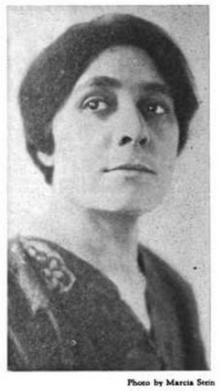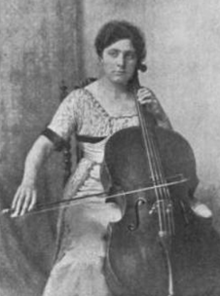May Mukle
May Mukle | |
|---|---|
 May Mukle, from an advertisement published in 1919. | |
| Born | 14 May 1880 London |
| Died | 20 February 1963 (aged 82) Cuckfield, Sussex |
| Nationality | British |
| Occupation | Cellist |

May Henrietta Mukle FRAM (14 May 1880 – 20 February 1963) was a British cellist and composer.[2] She has been described as a "noted feminist cellist",[3] who encouraged other women cellists.[2]
Early life
[edit]Mukle was born in London, the daughter of Leopold Mukle.[4][5] Her father was an immigrant from Rohrbach near Furtwangen in the Black Forest, Germany, who trained as a clockmaker, but was best known as an organ builder in London and part of the partnership Imhof & Mukle.[6] Her sisters Anne (pianist), Lillian (trumpet), Flora (singer), Louisa, and Clara were also musicians. She studied cello at the Royal Academy of Music with Alessandro Pezze.[7]
Career
[edit]Mukle was a working musician for over fifty years, including concert tours in Australia, Africa, and Asia.[4] Her instrument was built by Montagnana and bought for her by an anonymous donor.[8] Mukle was also a composer of works for cello and piano.[9]
She performed as a soloist, and in chamber ensembles.[10] She was a member of Rosabel Watson's Aeolian Ladies' Orchestra, and of the all-women English Ensemble, with violinist Marjorie Hayward, violist Rebecca Clarke, and pianist Kathleen Long.[4] In 1925, Mukle played at New York's Aeolian Hall with Percy Grainger and Lionel Tertis.[11] With her pianist sister, Anne Mukle, she was a member of the Maud Powell Trio. Also with Anne, she gave the first performance of Ralph Vaughan Williams' Six Studies in English Folk Song in London in 1926.[5]
Mukle's apartment near Wigmore Hall was convenient for hosting visiting musicians; she also convinced the landlords to rent other apartments to musicians, so there would be fewer conflicts about noise. She founded the Mainly Musicians Club in a basement in London; during World War II, she converted it into a air raid shelter.[12] She was an original member of the Society of Women Musicians, present at the organization's first meeting in 1911.[7][13]
Mukle was described in The Times as "in the very front rank of living violoncellists",[2] and her obituary in The Times says of her: "by the turn of the century she was fully recognized not only as an outstanding musician but as one of the most remarkable cellists this country had produced."[14]
Personal life and legacy
[edit]Mukle broke her wrist in a car accident in 1959, at age 79, but resumed playing after it healed,[5] performing in North Carolina in 1960.[15] She died at Cuckfield, Sussex, in 1963, at the age of 82.[8] Her portrait, painted by John Mansfield Crealock, is held in the museum of the Royal Academy of Music.[16] The May Mukle Prize was founded in 1964 in her honour and is awarded each year to a cello student of the college.[2][4]
References
[edit]- ^ "May Mukle Recital Wins London Praise" Musical Courier (11 September 1919): 38.
- ^ a b c d Campbell, Margaret (2011). The Great Cellists. Faber & Faber. ISBN 9780571278015. Retrieved 27 January 2016.
- ^ McVeigh, Simon (2010). "Women violinists in London's concert life around 1900". In Hornby, Emma; Maw, David Nicholas (eds.). Essays on the History of English Music in Honour of John Caldwell. Boydell & Brewer. p. 251. ISBN 9781843835356. Retrieved 27 January 2016.
- ^ a b c d Stevenson, Joseph. "May Mukle | Biography & History". AllMusic. Retrieved 5 March 2020.
- ^ a b c "May Mukle, Cellist". Historical Cellists. Retrieved 5 March 2020.
- ^ Smith, Kenny (30 August 2019). "Bid to raise £60,000 to save castle's rare instrument". Scottish Field. Retrieved 5 March 2020.
- ^ a b Who's who in Music: A Biographical Record of Contemporary Musicians. Pitman. 1915. p. 193.
- ^ a b Campbell, Margaret. "Mukle, May (Henrietta)". Grove Music Online. Retrieved 27 January 2016.
- ^ Mukle, May. "The Light Wind". Wise Music Classical. Retrieved 5 March 2020.
- ^ Seddon, Laura (15 April 2016). British Women Composers and Instrumental Chamber Music in the Early Twentieth Century. Routledge. ISBN 978-1-317-17134-8.
- ^ Downes, Olin (10 February 1925). "MUSIC; The Beethoven Concert". The New York Times. ISSN 0362-4331. Retrieved 5 March 2020.
- ^ Horvath, Janet (4 May 2018). "Meet May Mukle, One of Britain's First Great Female Cellists". Interlude. Retrieved 5 March 2020.
- ^ "The Society of Women Musicians". The British Library. Retrieved 5 March 2020.
- ^ "Obituaries: Miss May Mukle". The Times. No. 55638. 1 March 1963. p. 14. Retrieved 28 January 2016.
- ^ "May Mukle, cellist, Mrs. Sutherland Ideler, pianist". UNCG University Archives. 13 October 1960. Retrieved 5 March 2020.
- ^ "Portrait of May Mukle. By John Mansfield Crealock. Oil on canvas, 1930". Royal Academy of Music. Retrieved 27 January 2016.
External links
[edit]- "May Mukle (1880–1963), FRAM by John Crealock". Art UK. Portrait of May Mukle
- "May Mukle. Autographed postcard". Royal Academy of Music: Museum. Retrieved 27 January 2016.
- Autographed postcard print of May Henrietta Mukle, before World War I, in the National Portrait Gallery.
- Recordings of May Mukle included in the National Jukebox, Library of Congress.
